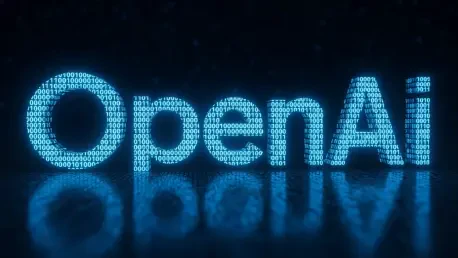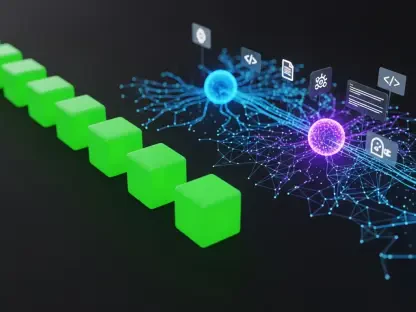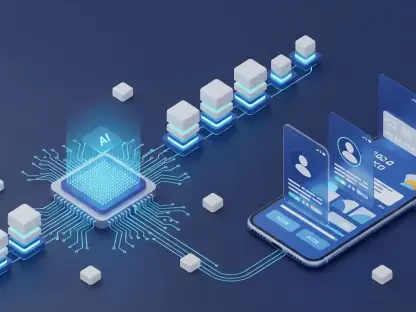Imagine a scenario where a hastily drawn sketch on a piece of scrap paper becomes a fully operational website in mere minutes, eliminating hours of manual coding and bridging the gap between imagination and reality. OpenAI Codex is turning this vision into a tangible breakthrough, redefining front-end development with its cutting-edge artificial intelligence capabilities. This revolutionary tool interprets visual inputs such as sketches, wireframes, and screenshots, transforming them into responsive, functional code with remarkable speed. By doing so, it alleviates the burden of repetitive tasks, allowing developers to channel their energy into creativity and innovation. Seamlessly integrating with existing workflows, Codex stands as a powerful ally in modern software creation, promising to reshape how projects evolve from concept to completion. Its arrival marks a significant shift, sparking curiosity about how AI can further streamline the development landscape.
Exploring the Mechanics of AI-Driven Development
Revolutionizing Design with Multimodal Processing
The core strength of OpenAI Codex lies in its ability to process a variety of visual inputs and convert them directly into working code, a process that fundamentally changes the transition from design to implementation. This multimodal capability means that a rough hand-drawn interface or a basic wireframe can be understood by the tool, which then generates accurate, usable code with minimal human intervention. Such a feature drastically reduces the time spent on initial prototyping, enabling developers to see their ideas come to life almost instantly. This not only accelerates the early stages of development but also minimizes the disconnect often experienced between designers and coders, fostering smoother collaboration. By interpreting abstract visuals into concrete results, Codex paves the way for a more intuitive approach to building digital products, making the leap from brainstorm to browser quicker than ever.
Beyond the initial transformation, Codex introduces an iterative refinement process that enhances its output based on user feedback, ensuring alignment with the creator’s vision. This adaptive mechanism allows the tool to analyze its own generated code, identify potential mismatches with the input design, and make necessary adjustments without requiring constant manual corrections. Such a dynamic approach means that developers can focus on fine-tuning user experience rather than wrestling with syntax or structural errors. This iterative cycle acts as a virtual collaborator, learning from each interaction to produce increasingly polished results. The ability to refine continuously ensures that the final product remains true to the original intent, streamlining workflows while maintaining a high standard of quality. This feature sets Codex apart as a tool that evolves alongside the needs of its users.
Streamlining Workflows through Automation
One of the most impactful aspects of Codex is its capacity to automate repetitive coding tasks, which often consume a significant portion of a developer’s time and energy during projects. Tasks such as crafting responsive navigation bars, implementing standard design patterns, or setting up basic layouts are handled effortlessly by the tool, freeing up mental space for more strategic thinking. This automation extends to ensuring that the generated code is inherently responsive, functioning seamlessly across a range of devices from mobile phones to desktop computers without additional adjustments. By taking on these mundane responsibilities, Codex allows developers to prioritize creative problem-solving over routine grunt work, significantly boosting overall productivity in tight schedules.
Additionally, Codex reduces the likelihood of human error by incorporating advanced features like light and dark mode toggles or screen-size adaptability with precision and consistency. These elements, often prone to oversight when coded manually, are integrated flawlessly, resulting in cleaner, more reliable outputs that require less debugging down the line. The efficiency gained from this automation is transformative, particularly for teams managing multiple projects or facing stringent deadlines. Developers can trust that the foundational aspects of their applications are solid, enabling them to dive deeper into enhancing functionality or user engagement. This shift not only saves time but also elevates the quality of the final product, positioning Codex as an indispensable asset in modern development environments.
Practical Implementation and Industry Integration
Enhancing Tools with Seamless Compatibility
A standout feature of OpenAI Codex is its ability to integrate effortlessly with the existing ecosystem of development tools, ensuring that adoption does not disrupt established workflows. Compatibility with popular Integrated Development Environments (IDEs) and Command Line Interface (CLI) tools means that developers can incorporate Codex into their current setups without needing to overhaul their processes. Furthermore, its support for cloud platforms simplifies testing and deployment, maintaining consistent performance across various environments. This harmonious integration ensures that Codex enhances productivity rather than complicating it, allowing teams to continue using familiar systems while benefiting from AI-driven advancements. Such compatibility is crucial for widespread acceptance in a field often resistant to disruptive changes.
Equally important is Codex’s role in streamlining the testing and debugging phases of development, which are often time-intensive and error-prone when done manually. By simulating different configurations, such as varying screen sizes or operating conditions, the tool helps identify potential issues before they become significant problems. This preemptive approach reduces the need for extensive revisions later, saving both time and resources. Developers can rely on Codex to verify that applications perform reliably under diverse scenarios, making the debugging process less daunting. This capability underscores the tool’s practical value, as it not only fits into existing frameworks but also actively improves the efficiency of critical development stages, ensuring smoother project timelines and higher-quality outcomes.
Versatile Applications in Real-World Scenarios
The practical applications of Codex span a wide array of front-end development tasks, demonstrating its versatility and value across different project types. From converting wireframes into interactive prototypes to generating visually appealing data visualization dashboards, the tool handles complex tasks with precision and speed. This ability to transform conceptual designs into functional components allows developers to quickly test ideas and gather feedback, accelerating the iteration process. Whether working on a small personal project or a large-scale enterprise application, Codex proves to be a reliable partner in bringing concepts to fruition. Its capacity to adapt to various needs highlights its role as a flexible solution in an ever-evolving field.
Moreover, Codex excels at automating the generation of boilerplate code, a task that, while necessary, often slows down progress due to its repetitive nature. By taking on this responsibility, the tool enables developers to focus on higher-level aspects such as enhancing user experience or innovating new features. This shift in focus can lead to more polished and creative outcomes, as time is no longer spent on routine scripting. The impact is particularly notable in collaborative settings, where teams can allocate resources more effectively, ensuring that each member contributes to the project’s strategic goals. Codex’s real-world utility lies in its ability to balance efficiency with quality, making it an essential resource for developers aiming to deliver exceptional results under any circumstances.
Vision for Tomorrow and Broader Implications
Pioneering New Frontiers in Development
Looking toward the horizon, OpenAI Codex holds immense potential to expand its capabilities beyond current applications, promising exciting advancements in software creation. Its multimodal processing could evolve to support mobile and desktop app development, enabling the creation of cross-platform solutions with the same ease as web projects. Such an expansion would open new doors for developers, allowing them to tackle diverse challenges without switching between multiple tools. The prospect of crafting seamless applications across different environments hints at a future where Codex becomes a central hub for all development needs. This potential growth underscores the tool’s forward-thinking design, positioning it as a catalyst for broader innovation in the industry.
Another anticipated advancement is the enhancement of autonomous refinement, where Codex could optimize code with minimal user input, delivering near-perfect results consistently. This level of independence would further reduce the manual workload, allowing developers to focus almost entirely on conceptual and strategic aspects of their projects. Imagine a tool that not only generates initial code but also fine-tunes it over time based on evolving requirements or performance metrics. Such a feature would represent a significant leap forward, making Codex an even more reliable partner in complex development scenarios. These possibilities paint a picture of an AI-driven future where efficiency and precision redefine the boundaries of what developers can achieve.
Reflecting Broader Industry Shifts
Codex’s emergence aligns closely with a growing industry trend toward AI-driven solutions that streamline and enhance coding processes, marking a pivotal shift in how software is built. This tool embodies the consensus that automation can fundamentally alter the development landscape by eliminating manual grunt work and accelerating project timelines. The emphasis on bridging design and implementation reflects a broader desire to make technology more accessible and efficient for creators at all levels. As AI continues to integrate into development practices, tools like Codex are setting the stage for a new standard where speed and innovation go hand in hand, reshaping expectations across the field.
Additionally, the focus on interoperability seen in Codex mirrors an industry-wide push for technologies that enhance rather than disrupt existing workflows. Its seamless compatibility with local setups and cloud-based environments ensures that developers can adopt it without sacrificing their preferred tools or methods. This alignment with current practices is vital for encouraging adoption on a large scale, as it reduces the learning curve and integration challenges. By fitting into established ecosystems, Codex exemplifies how new solutions can add value while respecting the frameworks developers rely on, contributing to a more cohesive and efficient industry landscape.
Redefining Standards in Software Creation
Reflecting on the journey of OpenAI Codex, its contributions to front-end development over recent years stand as a testament to the power of AI in transforming complex workflows into streamlined processes. The tool tackled long-standing challenges by converting visual designs into functional code and automating repetitive tasks, setting a benchmark for efficiency that many strove to match. Its integration with existing systems proved that innovation could coexist with tradition, enhancing rather than overhauling established practices. Looking back, Codex redefined what developers expected from their tools, proving that creativity and precision could flourish together under the right technological support.
As the industry moves forward, the legacy of Codex offers actionable insights for future progress, encouraging developers to embrace AI as a core component of their toolkit. Exploring its potential for cross-platform capabilities and autonomous optimization could unlock new levels of productivity in the years ahead. The focus should remain on fostering tools that not only solve current pain points but also anticipate emerging needs, ensuring adaptability in a fast-paced digital world. By building on the foundation Codex laid, the development community can continue to push boundaries, crafting solutions that inspire and empower the next generation of creators.









